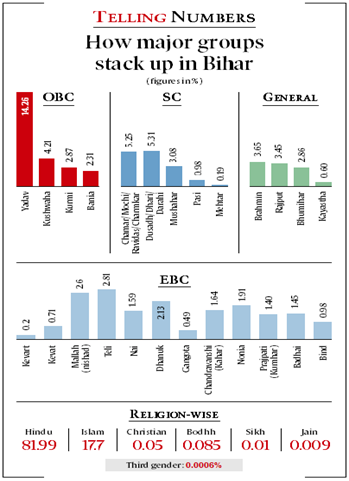

Context
The Bihar government has released the results of its socio-economic caste survey in the State.
Key takeaways from the survey:
- The survey puts the share of Extremely Backward Classes (EBCs) and Other Backward Classes (OBCs) cumulatively at more than 63%.
- Category-wise classification:
- The “unreserved” category i.e. the “forward” castes is about 5%.
- The Extremely Backward Classes (EBCs) are the biggest social group comprising 36.01% of the State’s population.
- The OBCs accounts to 27.12%, and the Scheduled Castes (SCs) to 19.65%.
- Scheduled Tribes (STs) are only 1.68%.
- Total Population: Bihar’s population, according to the survey, is 13, 07, 25,310, compared to the 10.41 crore recorded in the 2011 census.
- Religion-based data:
- Hindus comprise 99% of the population, and
- Muslims 72%.
- The populations of Buddhists, Christians, Sikhs, Jains, and other religious denominations are minuscule.

|
Who are EBCs?
|
Probable outcomes of the Survey:
- OBC Quota Demand: The survey's findings are likely to intensify calls for increasing the OBC (Other Backward Classes) reservation in India beyond the current 27%.
- There's also growing demand for a separate quota within the OBC category for EBCs (Economically Backward Classes).
- Sub-Categorization: The Justice Rohini Commission, which has been studying sub-categorization of castes within OBCs.
- These recommendations could become significant, and Bihar's survey might inspire other states to conduct similar studies.
- Reservation Ceiling Debate: The survey data could reignite the debate about the 50% cap on reservations set by the Supreme Court in 1992.
- This limit was imposed to maintain administrative efficiency.
Why Caste-based survey is necessary?
- The demand for caste census goes beyond politics. India runs the world’s largest affirmative welfare programme based on caste identity.
- Reservation in educational institutes and government jobs are provided on the basis of caste identities.
- Bihar Chief Minister’s strong advocate of caste census, said enumeration of population of each caste group would help the government formulate more accurate welfare programmes.
- To get an accurate data on caste and fixing quotas for reservation, the census holds significance.
- Different data set based on sample surveys might not be a true reflection of the current caste headcount in India.
- The difference in data sets like by NSSO, also differ from the Mandal Commission estimates that form the basis of caste-based reservations and policy formulation.
Impacts:
- Increase in the reservation quota in Bihar: As per the report data, state government in Bihar has plans to increase reservation quotas based on population proportions.
- Will lead to more welfare schemes: Experts believe that the caste survey report will compel political parties to introduce more welfare programs for the disadvantaged sections of society, including OBCs, EBCs, SCs, and STs, who constitute 85% of the State's population.


